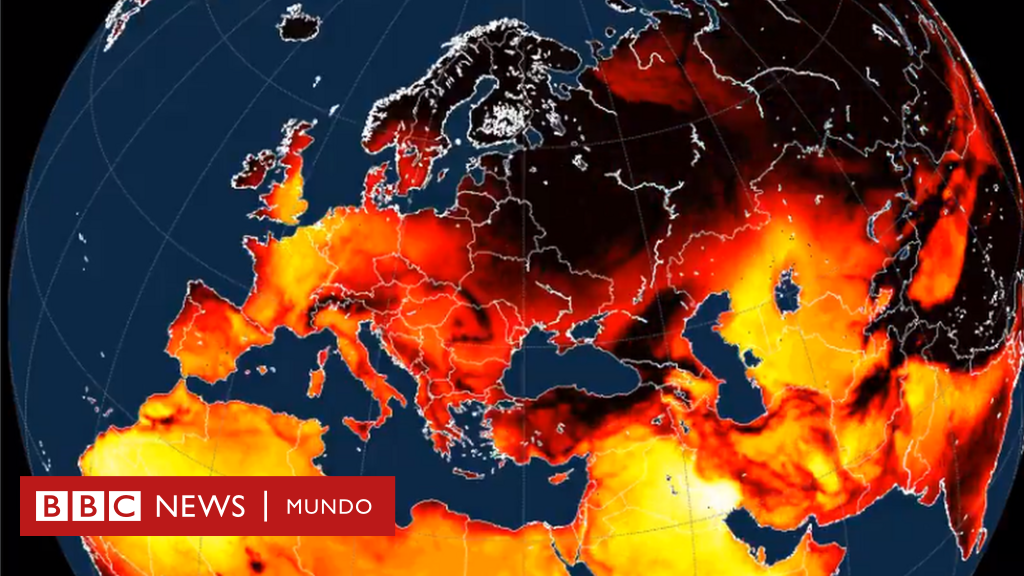What are the causes of the historical heat wave suffocating Europe?

- Drafting
- BBC News World
image source, metdesk
An unprecedented heat wave affecting large parts of Western Europe.
Stifling temperatures have set records in recent days in several countries, and just on Tuesday, the UK broke historic records three times in the same day and reached 40And the3 degrees Celsiusa number that is not recorded there.
France issued severe heat warnings, the Netherlands also recorded record temperatures for July, and a heat-driven fire destroyed several cars in Belgium.
The Forest fires in France, Portugal, Spain and Greece They have forced thousands of people to evacuate their homes, and although official figures are still unknown, the number of deaths is estimated to be high.
According to the forecast, the heat wave will head north in the coming days, and the temperature is also expected to reach 40 degrees Celsius in the far south of Belgium, as well as in western and southwestern Germany.
Meteorologists in Italy have warned that the temperature could range between 40 and 42 degrees Celsius between Wednesday and Friday.
Experts warn that heat waves are on the rise More frequent, more intense and longer lasting due to man-made climate change.
This Tuesday, the German environment minister said, Steffi LemkeThe climate crisis, he said, means his country and Europe will have to rethink their preparations for extreme weather, drought and floods.
The effects of climate change in Europe made headlines earlier this month when melting ice triggered an avalanche that killed 11 people in Italy.
Now, experts have warned that new fissures are opening up in the Alpine peaks and that ice is melting even on Western Europe’s tallest mountain, Mont Blanc.
The world has already warmed by about 1.1°C since the beginning of the industrial era and temperatures will continue to rise unless governments around the world make drastic cuts in emissions.
But while global warming is the root cause, what is causing this unusual heat wave in Europe in particular?
the explanation
Many academics, experts and even World Meteorological Organization (The International Organization for Migration) explained since the beginning of the month the combination of factors in the climate of the planet that led to the current situation.
On its website, the International Organization for Migration explains that the heat wave originated in North Africa and gradually moved to the North.
image source, Reuters
Meteorologist Scott Duncan explained in the presentation Newsnight The BBC said the wave was caused by high summer temperatures in the Sahara, which coincided with the Atlantic low pressure regime between the Azores and Madeira.
According to him, this system fueled the warm front that pushed him towards Western Europe.
“The low pressure axis near Portugal acts as an engine to raise the heat northward,” he explains.
jet streams
But behind this behavior is another atmospheric phenomenon that has caused thermal currents to rise dramatically towards Europe.
As the specialist website AccuWeather explains, it is related to the behavior of the jet stream, a type of “atmospheric river” that flows rapidly from east to west at high altitudes in the Northern Hemisphere.
BBC meteorologist Nick Miller comments that over the past week the jet stream in Europe and North America has dominated powerful hills of high pressure, also known as heat domes.
These oscillations connect the two continental heat waves (European and North American) through a pattern of atmospheric waves, making their incidence in parts of Europe much greater.
This is because strong air currents in the Atlantic Ocean also intensify the high pressure on the continent.
worrying future
Duncan explains that heat waves aren’t new: They’ve been around even before the advent of man.
Rather, in nature they have a “beneficial” effect because they help transfer heat – and therefore energy – from the equator to the poles.
however, The problem is that human actions on this planet make it more frequent And many countries, such as European countries, are not ready for this.
image source, Reuters
“The problem is that we’ve seen it intensify over the past decades and we’re not ready for that. The impact of climate change is behind all of this and it is expected that in the future we will have more extreme waves,” he said. Newsnight.
The meteorologist added that although the wave is now affecting parts of Europe, rising temperatures are a global problem, so the whole world may be affected in the future.
“We will see heat records continually being broken around the world as the average global temperature rises,” he said.
You can now receive notifications from the BBC World. Download and activate the new version of our app so you don’t miss our best content.

“Bacon advocate. Certified creator. Twitteraholic. Tv junkie. Beer fanatic. Internet nerd. Passionate thinker. Reader.”




:quality(85)/cloudfront-us-east-1.images.arcpublishing.com/infobae/OF4NJDPGLBEYJAZ5XZMH3OIPJ4.jpg)



